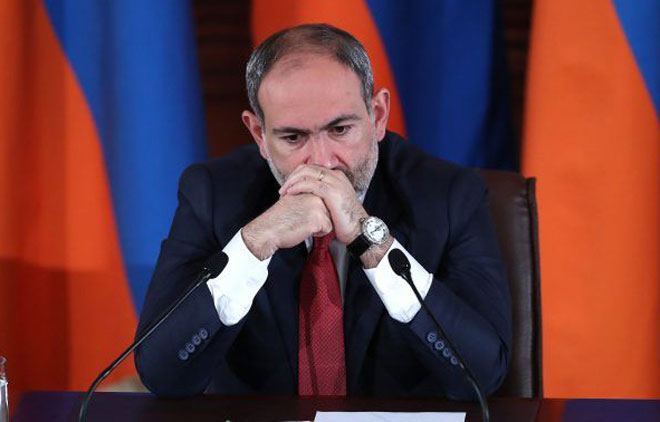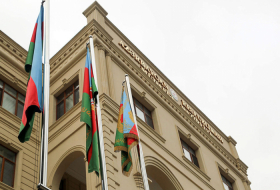The revision of the Armenian Constitution has been a topic of debate as the normalization process between Armenia, Azerbaijan and Türkiye progresses.
That is because the Armenian Constitution's spirit and philosophy are based on a declaration of independence that recognizes the regions of Azerbaijan and Türkiye as Armenian.
Armenian officials have demonstrated, via their actions over the last 30 years, that it is more than simply a text; it is also part of Armenia's official policy. While occupying Azerbaijan's territory, Armenia left the annexation of Eastern Anatolia, which is Western Armenia, according to Armenian claims, to future generations, according to a remark made by former Armenian President Serzh Sarkisyan in 2011 in front of young activists.
As a result, for the true normalization process that began between Azerbaijan-Armenia and Türkiye-Armenia after the Second Karabakh War to be effective and to avoid any negative consequences in the future, the Armenian Constitution must be revised.
The only solution: Rewriting the constitution
Following the Second Karabakh War, Azerbaijani President Ilham Aliyev raised the issue for the first time in September 2021, stating that Armenia's Constitution should be revised to achieve true peace. Armenian Prime Minister Nikol Pashinyan has lately expressed similar sentiments, claiming that the constitution should be rewritten rather than revised.
To do this, the constitution will be changed by a referendum. Following Pashinyan's comments, Aliyev reiterated the need for changes to the Armenian Constitution to sign a peace agreement.
The Armenian Declaration of Independence of Aug. 23, 1990, contains territorial claims against Türkiye and Azerbaijan.
The statement includes the following territorial claims regarding Azerbaijan: "Based on the December 1, 1989, joint resolution of the Armenian Soviet Socialist Republic (SSR) Supreme Council and the Karabakh National Council on the "Reunification of the Armenian SSR and the Mountainous Region of Karabakh."
In Article 11 of the statement, Turkish territory is referred to as Western Armenia and allegations against Türkiye are expressed as follows: "The Republic of Armenia stands in support of the task of achieving international recognition of the 1915 Genocide in Ottoman Türkiye and Western Armenia."
The phrase "Western Armenia" here refers to the eastern provinces of Türkiye. At the time of the declaration's adoption, Armenian nationalists, including Dashnaks, had significant power in Armenia, thanks to the efforts of the Karabakh committee, which was formed Feb. 13, 1988, and included Levon Ter-Petrosyan, Armenia's first president.
Also, according to the preamble of the Armenian Constitution issued in 1995, the Armenian People acknowledge the basic foundations of Armenian statehood and pan-national aspirations embodied in Armenia's Declaration of Independence.
In summary, its constitution endorsed territorial claims against Azerbaijan and Türkiye.
All other laws governing the country's internal and international policies were written and developed in accordance with the constitution.
Mount Agri, situated within Türkiye's borders, was placed in the Armenian state flag as Ararat, symbolizing the reunification with Western Armenia. As a result, the protocol on normalization and development of diplomatic relations agreed between Türkiye and Armenia in 2010 could not be implemented. Because, under Armenian law, such foreign agreements must be ratified by the constitutional court before they can come into force.
The constitutional court authorized the protocols but noted that they could not violate the Declaration of Independence or the constitution.
Subsequently, the constitutional court found that the protocols signed with Türkiye acknowledging Türkiye's geographical integrity could not be in conflict with the Declaration of Independence, therefore maintaining a territorial claim against Türkiye.
The same circumstance may apply to the peace deal negotiated with Azerbaijan, in which case the peace agreement signed by Armenia and Azerbaijan will not result in permanent normalization and peace.
In particular, Azerbaijan proposes that the parties mutually accept each other's territorial integrity in the peace agreement.
But first, the Armenian Constitutional Court must ratify the agreement. The same court initially authorizes the agreement but may declare that it cannot be interpreted as violating the Declaration of Independence and the constitution.
Assume that all of the current constitutional court members are Pashinyan-appointed judges who recognize the agreement without objections.
It is also accepted by parliament because the ruling party has the majority of seats.
But as long as Armenia's present declaration of independence and constitution include territorial claims against Türkiye and Azerbaijan, the peace agreement will remain in jeopardy if the government in Armenia changes and radicals take power. In this case, any political party or organization can start a lawsuit against the agreement signed with Azerbaijan because it is unconstitutional, and the signed agreement might be declared null and void.
Benefits of a new constitution
Rewriting the constitution would also be a politically beneficial move for Armenia. Armenia remained out of regional projects after making territorial claims against its neighbors and occupying one of its neighboring territories.
The defeat in the 2020 war freed Armenia from its territorial adventure around Karabakh. But the opposition in Armenia has already started taking action against the possible constitutional referendum.
Public opinion polls reveal that the majority of Armenians are against the removal of territorial claims against Azerbaijan and Türkiye from the constitution.
Therefore, it will not be easy for incumbent Pashinyan to change the constitution. But rewriting the constitution would cause a conceptual change at governmental and public levels toward Türkiye and Azerbaijan, which is one of the most important obstacles to normalization.
This can lead to a wider change in Armenia and the region, as it would open up a path toward normalization with Türkiye and Azerbaijan and wider regional cooperation.
AzVision.az
More about:
















































